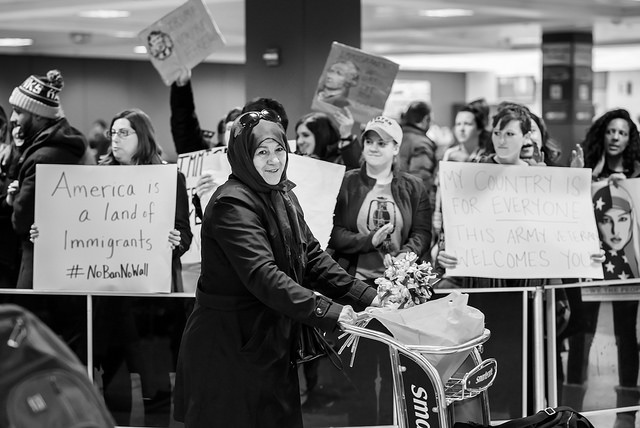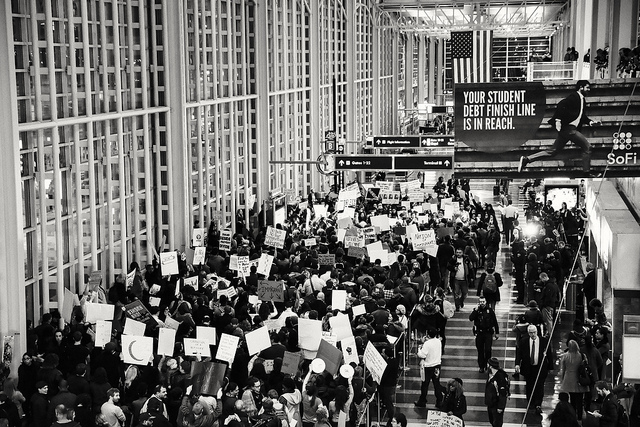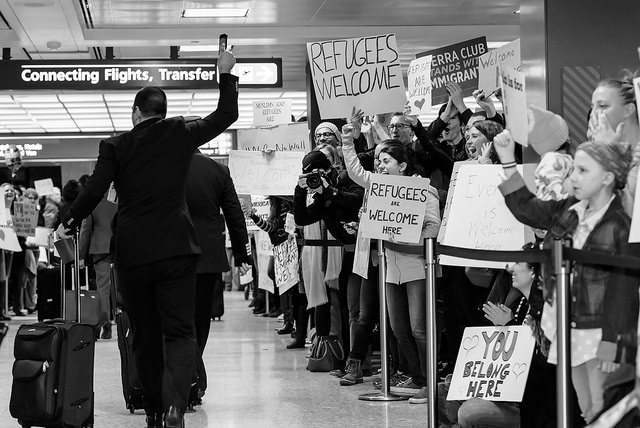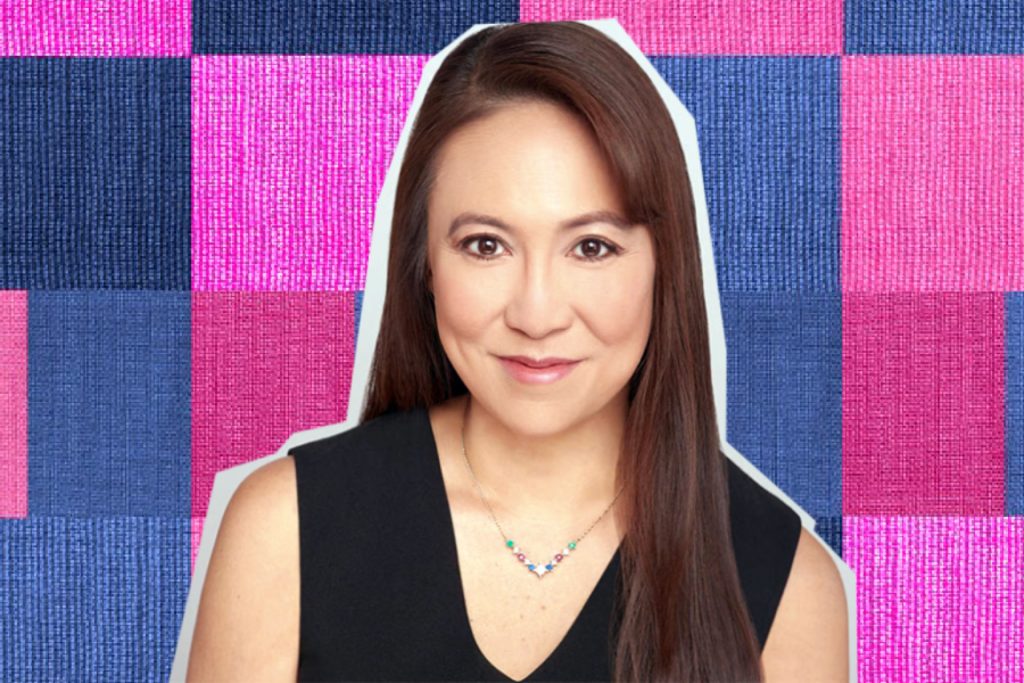An interview with the Muslim American writer and activist about how Trump has unintentionally made America great

February 23, 2017
Months before the United States got its Trumpeting wake-up call to a new authoritarian regime, Moustafa Bayoumi was anticipating the election outcome with a characteristic mix of terror and laughter. The New York-based Muslim American writer and academic had long warned that now-President Donald Trump represented something more than just a bigoted buffoon. But now that President Trump is rolling out his agenda, Bayoumi has no time for schadenfreude.
But, back in May 2016 he still had hope that Trump would be defeated by a strong coalition of Muslims, migrants, and people of color. He was right in one sense—Trump delivered on his promise in unexpected ways for those who stand proudly for another kind of America. If Trump’s America was one threatened from all sides by outsiders, “our” society would flip the script on the effort to cast Muslims as enemies and instead foster new solidarities across many marginalized communities. As he wrote in The Guardian:
While his campaign traffics in violence and threats, Trump doesn’t scare me. His corrosive comments on Muslims and Mexicans will only bring Muslims and Mexicans, and everyone else, closer together…
Even more fundamentally is the organising energy I see from young Muslim Americans and so many others determined not to let their country be taken over by radical haters. What I’ve never seen–and don’t expect to see–are Muslims cowering in fear of Trump. He may never have expected it, but Trump is helping to build the strongest, most multicultural, multifaith, and multi-ethnic America we have ever had. So, thank you, Donald. You really are making America great.
But we have much more to thank Donald for than many of us expected. After the election, the terror sank in. Observing what his students were telling him in class, Bayoumi reflected on the fear bearing down on a global metropolis where Ground Zero still loomed in the public imagination and “counterterrorism” and policing are increasingly entangled to constrict civil liberties.
A young African American woman told me she worked at a bank on the Lower East Side of Manhattan, where she has often had to deal with an older, belligerent white woman. But the last time this woman came into the bank, she began yelling at my student, threatening her and screaming that my student would no longer be working there after Trump was elected. I was appalled by the story, but the other students merely nodded knowingly…
And another young Muslim student told me she worked in daycare at a local mosque, and how the little five- to seven-year-old kids now repeatedly asked her—with those large, innocent, heartbreaking eyes—if they would have to leave the U.S. once Trump was elected.
It is, of course, strange, when you’re trying to be the grown-up, to have to somehow rationalize a surreal political situation to a rightfully confused and frightened child. How do you explain your right to exist under a political regime that seems obsessed with erasing your very humanity?
Stranger still is that the whole country seems unbelievably polarized both politically and geographically, so that a city like New York, for all its institutionalized racism and segregation, is branded as, relatively speaking, a bastion of progressivism.

But, it’s also refreshing to see that what makes New Yorkers progressive isn’t necessarily an ideology but a lived reality; the experience of coexistence is what gives the city its cosmopolitan spirit. Every ethnic and racial borderline in the city has been a site of friction and of cultivated harmony. And the New York that Bayoumi and other local activists see is democracy embodied.
With a steady stream of panic-inducing executive orders throwing us a continual spasm of chaos, this moment seems almost like the best and worst kind of inevitability smashed together in a slow-motion trainwreck. Now, connecting with community—our own and others—can help us feel anchored in a world otherwise unhinged.
As someone who called the opposition’s victory from the other side well before the shock hit, and who now stands firmly on the frontline, Bayoumi spoke with me shortly after the “Muslim Ban” was imposed. In this dialogue, edited for clarity and length, he reflects on the meaning of Trump in an age when multiculturalism seems to be at the precipice of something both great—because it makes us stronger—and terrifying—because it makes the other side that much more powerful, too.
Michelle Chen: The Trump election didn’t surprise you, but what’s your impression of the public response to the new administration?
Moustafa Bayoumi: I guess I am pleasantly surprised or inspired by the response that I’ve seen in NYC, but I know that it’s happening all around the country, and even beyond the country. People are demonstrating loudly and collectively against this kind of blatant xenophobia masquerading as some kind of policy. And I think that that’s really important to pay attention to and organize around the response.
I think what we’re seeing is young, urban people having really progressive politics and pretty sophisticated and well articulated and really creative politics.
At the same time, the Muslim ban has quite a high level of support, so I don’t want to be too optimistic, but I think it’s really important to see that, at least in this short moment we’re living through right now, politics seems to be changing. It’s taking to the streets, it’s in people’s faces, it’s their daily lives. People are not just delegating it to representatives; in fact they’re really pushing their representatives to try to represent them.

I still think [the anti-Trump campaigning] should do a lot more with regards to American foreign policy and American interventionism and imperialism. I think there’s really good connections that people on the left and people who are opposed to Trump are making with regards to Black Lives Matter and LGBTQ rights and also indigenous rights in the United States, but those are by and large domestic issues. I still think there’s a place for a more sustained critique of American foreign policy that we’re not hearing enough of.
What about global protests? Is there an avenue there for forming a true global justice or anti-imperialist movement, which we haven’t seen effectively mobilized in years or perhaps generations?
I don’t think we’re there yet. I think that there’s some international solidarity happening around the world. There’s also, frankly, a certain side of globalized capitalism that’s also just afraid of Trump and the kind of tariff economy and closed-off nation that he wants to bring back the United States. And so it’s not just the Left that’s afraid of Trump, but it’s probably even the capitalist class, a super influential wealthy global capitalist class that’s also opposed to Trump. I’m not saying we should join forces with them, I’m just saying that there are multiple forces to resist Trump.
Given that Trump won as a kind of “anti-establishment” candidate, albeit a nihilistic one, and he capitalized on an anti-globalization sentiment, what should be the Left’s answer to anti-globalization?
I think the problem with right wing populism is that it sees dignity and opportunity, and security—dignity primarily—as this zero-sum game. Like, “My dignity is what’s important, what I’m going to organize around, and I’m going to try to preserve it, and if that means that I have to somehow trample on your dignity, then so be it.” That’s wrong. The whole Trump Muslim ban is premised essentially on trading somebody else’s sense of security for your own false sense of security. If there’s one message to give, it’s, “Let’s not believe in this sort of zero-sum equation of these really important values that are the most fundamental values to our collective existence on this planet.”

As progressives, it feels like a very alienating political atmosphere, and there’s a sense that the divisions are so stark that communication between different ideological camps and social segments is becoming near impossible. Within our own communities, how do we keep from falling into despair?
Within the Muslim American communities that I know right now there’s actually not a lot of despair. There’s a lot of caution, but there’s a lot of optimism too because they see that there’s a whole new set of allies around. There’s a desire to connect with other communities.
If I had the time, I would love to organize a sort of Muslim Mexican party in New York, or something like that. Like, let’s connect outside of going through the mainstream, let’s find out all of our interests and our struggles. A big message doesn’t necessarily have to mean that we lose our own particularities; it’s actually knowing our own particularities that will allow us to connect with each other more authentically.
And on that note, what of the creative cultural responses we’ve been seeing, in the media or otherwise? How do cultural actions and instruments help broaden public dialogue?
People are often talking about how they’re preaching to the converted and that kind of thing. But I think that really clever, creative products that get put on the internet for example can also traverse even ideological boundaries. In the creativity of the response to the kind of Draconian politics, that’s where we’re actually creating the very society that we want to live in. It’s not just critique at this point, it’s actually construction. We’re actually constructing something out of it.
This piece has been co-published with CultureStrike.



